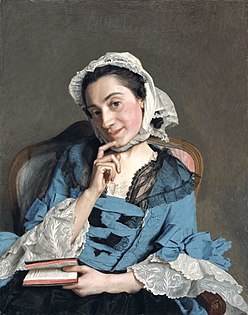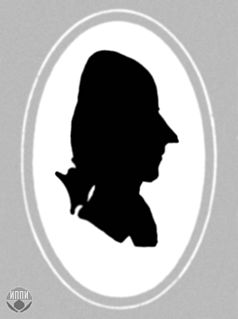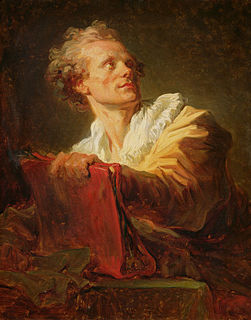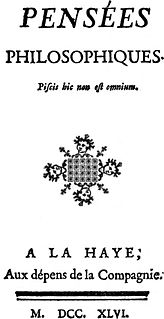 W
WDenis Diderot was a French philosopher, art critic, and writer, best known for serving as co-founder, chief editor, and contributor to the Encyclopédie along with Jean le Rond d'Alembert. He was a prominent figure during the Age of Enlightenment.
 W
WIvan Ivanovich Betskoi or Betskoy was a Russian school reformer who served as Catherine II's advisor on education and President of the Imperial Academy of Arts for thirty years (1764–94). Perhaps the crowning achievement of his long career was the establishment of Russia's first unified system of public education.
 W
WCatherine II, most commonly known as Catherine the Great, was Empress of Russia from 1762 until 1796—the country's longest-ruling female leader. She came to power following a coup d'état that overthrew her husband and second cousin, Peter III. Under her reign, Russia grew larger, its culture was revitalised, and it was recognized as one of the great powers worldwide.
 W
WÉtienne Noël Damilaville 21 November 1723 – 13 December 1768) was an 18th-century French man of letters, friend of Voltaire, Diderot and d'Alembert. He served in various military and administrative functions of the Ancien Régime. He was a member of the bodyguard of King Louis XV, and then a senior civil servant in the tax office responsible for supervising the Vingtième. His official roles meant that his correspondence was unexamined by censors, enabling him to circulate letters between leading thinkers of the day, most particularly during the Sirven affair.
 W
WMichel-Antoine David also David l'aîné was an 18th-century French printer, publisher and Encyclopédiste during the Age of Enlightenment. He was one of the four printers of the Encyclopédie.
 W
WThe House of Enlightenment, Denis Diderot or La Maison des Lumières Denis Diderot (MLDD) is a museum dedicated to Denis Diderot, the French philosopher, writer, and art critic, as well as his work, the Encyclopédie, ou Dictionnaire raisonné des sciences, des arts et des métiers. It is housed in the Hotel du Breuil de Saint Germain, located in Langres, built in the sixteenth century and rebuilt in the eighteenth century.
 W
WDidier Diderot was a French craftsman and the father of the encyclopedist, author, philosopher of enlightenment Denis Diderot.
 W
WLouise Florence Pétronille Tardieu d'Esclavelles d'Épinay, better known as Mme d'Épinay, was a French writer, a saloniste and woman of fashion, known on account of her liaisons with Friedrich Melchior, Baron von Grimm, and Jean-Jacques Rousseau, who gives unflattering reports of her in his Confessions, as well as her acquaintanceship with Denis Diderot, Jean le Rond d'Alembert, Baron d'Holbach and other French men of letters during the Enlightenment. She was also one of many women referenced in Simone de Beauvoir's The Second Sex as an example of noble expansion of women's rights during the 18th century.
 W
WEssay on the Life of Seneca was one of the final works of Denis Diderot. It contains an analysis of the life and works of Seneca, criticism of La Mettrie and Jean-Jacques Rousseau, autobiographical notes, and a tribute to modern America. It was published in 1779. In 1782 a revised and expanded version of this essay titled Essay on the Reigns of Claudius and Nero was published.
 W
WThe Fatalist is a 2005 Portuguese-French drama film written and directed by João Botelho. It is based on Denis Diderot's novel Jacques the Fatalist. It was entered into the main competition at the 62nd edition of the Venice Film Festival.
 W
WPrince Dmitri Alexeievich Gallitzin FRS was a Russian diplomat, art agent, author, volcanologist and mineralogist. By birth he was member of an ancient House of Golitsyn. He was a supporter of the recognition of the United States, and participated in the drafting of the League of Armed Neutrality. He was the first Russian educated people that made specific proposals on the abolition of serfdom in Russia.
 W
WFriedrich Melchior, Baron von Grimm was a German-born French-language journalist, art critic, diplomat and contributor to the Encyclopédie ou Dictionnaire raisonné des sciences, des arts et des métiers. In 1765 Grimm wrote Poème lyrique, an influential article for the Encyclopédie on lyric and opera librettos. Like Christoph Willibald Gluck and Ranieri de' Calzabigi, Grimm became interested in opera reform. According to Martin Fontius, a German literary theorist, "sooner or later a book entitled The Aesthetic Ideas of Grimm will have to be written."
 W
WThe Histoire philosophique et politique des établissements et du commerce des Européens dans les deux Indes, more often known simply as Histoire des deux Indes, is an encyclopaedia on commerce between Europe and the Far East, published anonymously in Amsterdam in 1770 and attributed to Abbot Guillaume Thomas Raynal. It achieved considerable popularity and went through numerous editions. The third edition, published in 1781, was censored in France.
 W
WAlexandre Jean Joseph Le Riche de La Pouplinière, sometimes also written Popelinière ou Poupelinière was an immensely wealthy fermier général, the only son of his father, Alexandre Le Riche (1663-1735), seigneur of Courgains, (Anjou) and Brétignolles (Touraine), likewise a fermier général. Besides his post as tax farmer, he was mainly one of the greatest patrons of music and musicians of the eighteenth century. A true patron of the Enlightenment he gathered round him a circle of artists, men of letters and musicians. He kept a private orchestra, "the best that was known in those days", according to Jean-François Marmontel, which was led for twenty-two years by Jean-Philippe Rameau, who was succeeded by Johann Stamitz and then by François-Joseph Gossec. The best Italian musicians, violinists, singers, were lodged with him and fed at his table, and all, according to Marmontel, were inspired to shine competitively in his salon. Voltaire was obliged to his generosity, and Maurice Quentin de La Tour and Carle van Loo both painted his portrait. Marmontel recalled later, "Never did a bourgeois live in more princely style, and the princes came to enjoy his pleasures."
 W
WAndré François le Breton was a French publisher. He was one of the four publishers of the Encyclopédie of Diderot and d'Alembert, along with Michel-Antoine David, Laurent Durand, and Antoine-Claude Briasson. Le Breton contributed some articles to the Encyclopédie, but acted primarily as publisher and editor, often against Diderot's will.
 W
WGuillaume-Chrétien de Lamoignon de Malesherbes, often referred to as Malesherbes or Lamoignon-Malesherbes, was a French statesman and minister in the Ancien Régime, and later counsel for the defense of Louis XVI. He is known for his vigorous criticism of royal abuses as President of the Cour des Aides and his role, as director of censorship, in helping with the publication of the Encyclopédie. Despite his committed monarchism, his writings contributed to the development of liberalism during the French Age of Enlightenment.
 W
WJacques-André Naigeon was a French artist, atheist–materialist philosopher, editor and man of letters best known for his contributions to the Encyclopédie and for reworking Baron d'Holbach's and Diderot's manuscripts.
 W
WThe Nun is a 2013 French drama film directed by Guillaume Nicloux. It is based on the 18th-century novel La Religieuse by French writer Denis Diderot. The film premiered in competition at the 63rd Berlin International Film Festival. It received two nominations at the 4th Magritte Awards, winning Best Actress for Pauline Étienne, and a nomination at the 39th César Awards.
 W
WOn the interpretation of Nature is a 1754 book written by Denis Diderot.
 W
WPhilosophical Thoughts is a 1746 book composed by Denis Diderot; it was his first original work.
 W
WMadeleine d'Arsant de Puisieux (1720–1798), was a French writer and active feminist.
 W
WJohann Karl Friedrich Rosenkranz was a German philosopher and pedagogue.
 W
WMaurice Tourneux was a French man of letters and bibliographer.